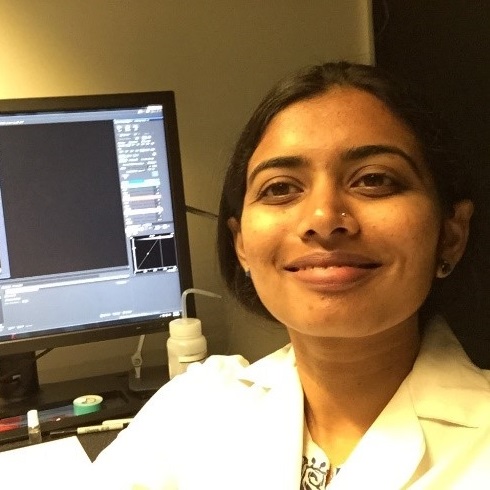Open Biology talks to Chandana Kondapalli, a Post-doctoral Research Scientist at Columbia University, about the first article she published during her PhD.

Open Biology talks to Chandana Kondapalli, a Post-doctoral Research Scientist at Columbia University, about the first article she published during her PhD. The article ‘PINK1 is activated by mitochondrial membrane potential depolarisation and stimulates Parkin E3 ligase activity by phosphorylating Serine 65’ is the most cited paper to date in Open Biology, and one of the Editor’s top five picks from the last five years since the journal’s launch.
Tell us about your paper
This is the first paper I published during my PhD (supervised by Miratul Muqit and Dario Alessi) and so it is very close to my heart. Many minds came together to accomplish this paper in which we describe the identification of a crucial substrate for a kinase called PINK1 that is implicated in early-onset Parkinson’s disease (PD).
Why do you think it’s been cited so much?
Although mutant forms of the PINK1 gene were discovered to be causal of early-onset PD, very little was known about its function at that point. Our paper was the first to describe that Parkin (another PD linked gene) is a substrate of the kinase PINK1, and that PINK1 mediated phosphorylation of Parkin at Ser65 enhances its ubiquitin ligase activity. This has major implications as to why loss of PINK1 activity and the downstream activity of Parkin can eventually lead to onset of PD. I believe our paper is cited so much because this laid the foundation for the PD research community to study PINK1-Parkin signaling in various cellular and animal models in greater detail.
What do you think makes a good scientific paper?
A good scientific paper is one where every experiment should have the best controls possible – all my mentors have laid emphasis on this. Also, I believe that a good paper should have figures that speak for themselves and written in a simple succinct manner so that reader is never bored or tired of it.
What prompted you to work in this field?
I am fascinated by how proteins communicate with each other and perform various functions in a cell. I therefore decided to study one such protein, which when it loses its function is known to cause PD.
What are you working on now?
I am currently exploring a key signaling pathway in the context of Alzheimer’s disease and the molecular mechanism behind how it causes loss of synapses in early stages of the disease.
What are the challenges in this field?
I think in the field of neurodegeneration we need the basic scientists and clinicians to work together to see the bigger picture in order to comprehend the disease. The brain is rather complicated and to get a good understanding of it many minds must meet.
What or who has been the biggest influence on your career?
My very first scientific mentor from India has been my biggest influence. She is a tough scientist but the most thorough and focused scientist I have met so far. I believe her influence has left an impact on me for my entire scientific journey.
What do you like to do in your spare time?
I love reading, dancing and spending time with my son.
If you weren’t doing this job, what would you be doing instead?
This is the toughest question of all! I don’t know anything else other than being a scientist! Perhaps I would have been a teacher.
What’s the best thing about your job/research? And the worst?
The best is the never-ending learning that one does in scientific research. The worst is definitely the fact that we will never make money and should just be satisfied with our data!
What advice would you give someone who is just starting a career in science?
I would like to quote Einstein here: “The most beautiful experience that we can have is the mysterious. It is the fundamental emotion that stands at the cradle of art and science”.
Never stop learning and never be afraid to ask questions.
Open Biology welcomes original, high impact research in cell and developmental biology, molecular and structural biology, biochemistry, neuroscience, immunology, microbiology and genetics.
